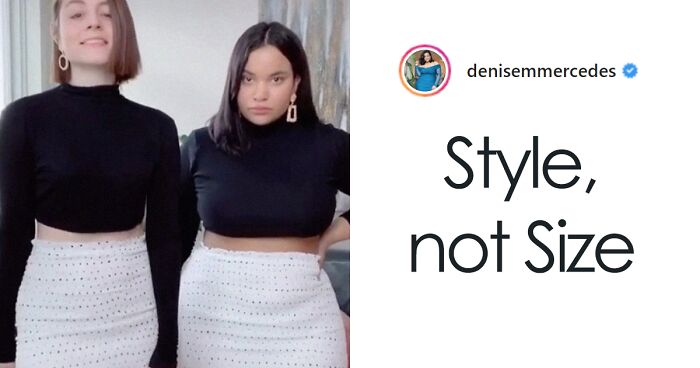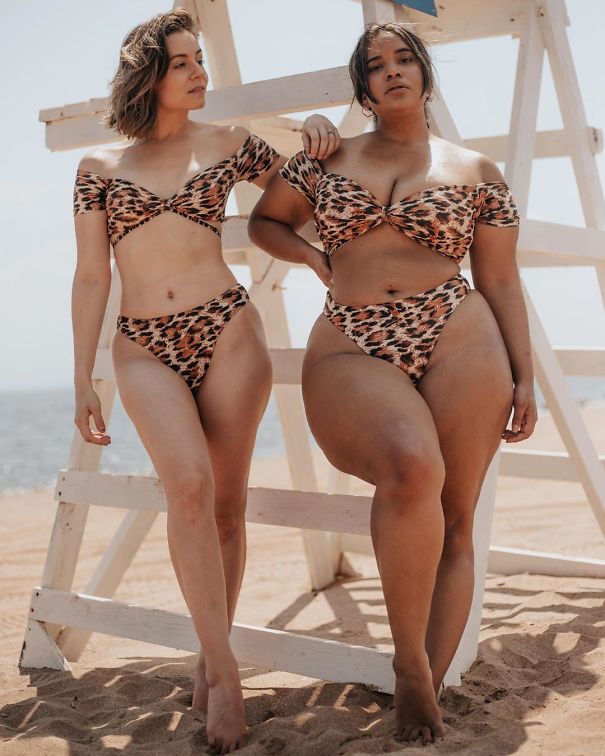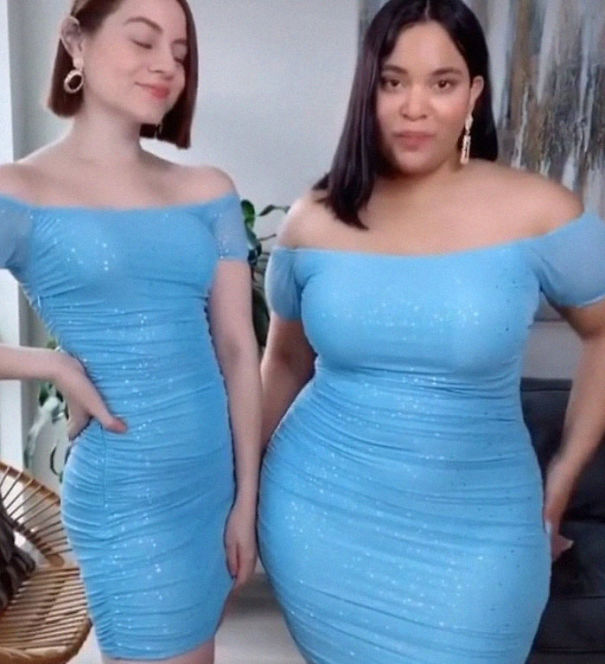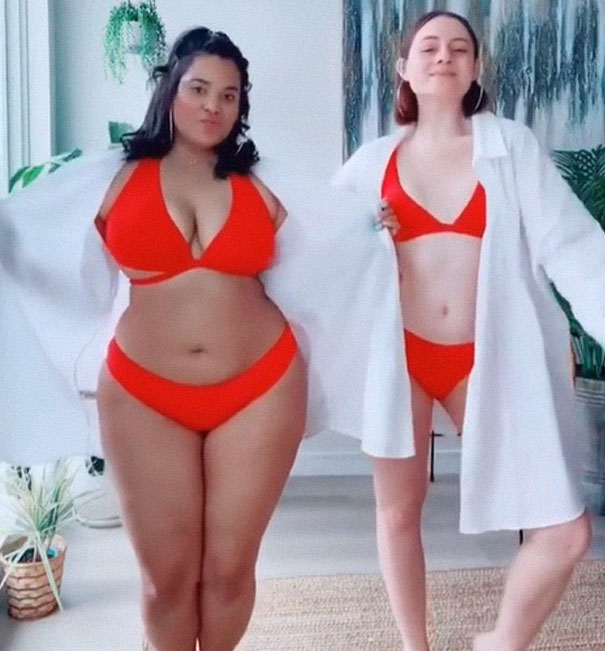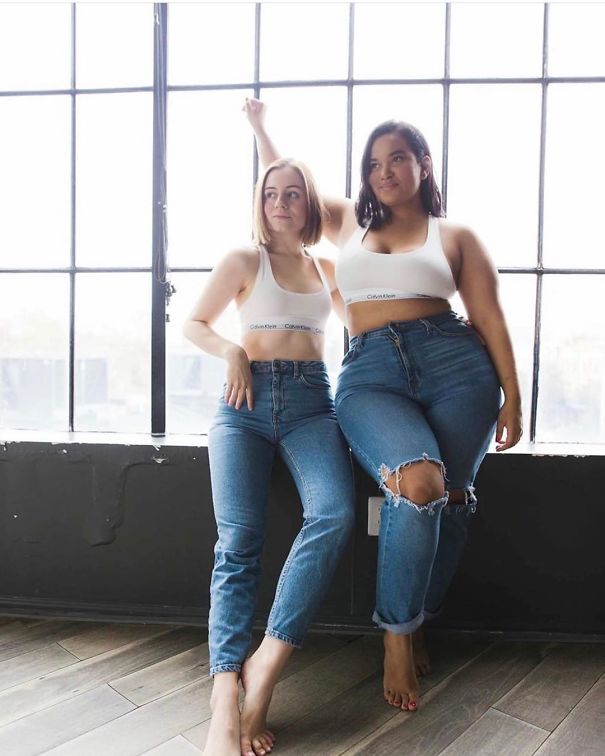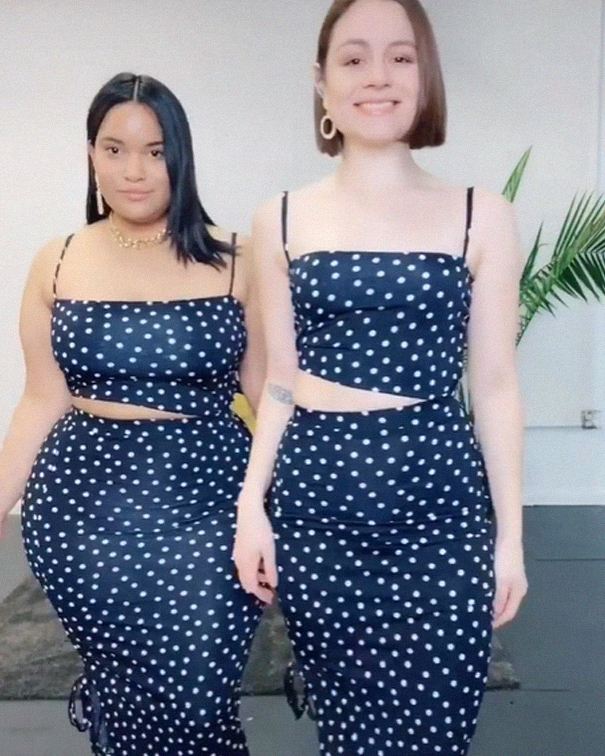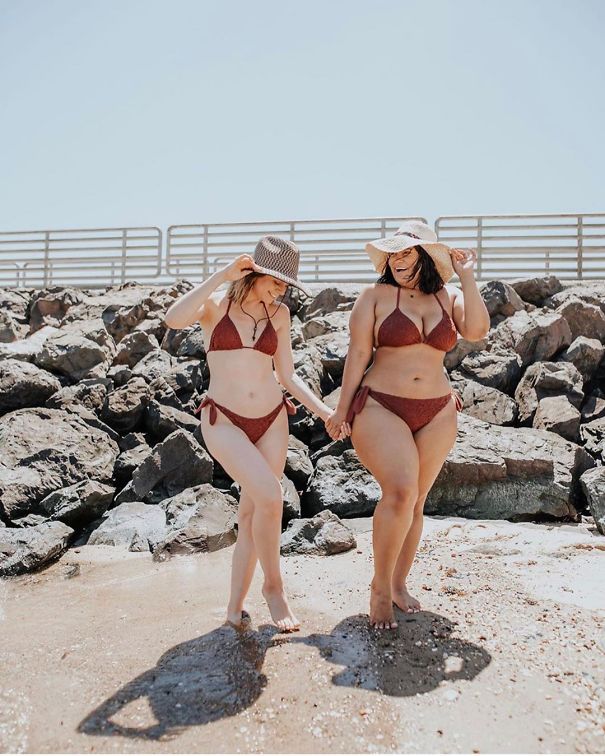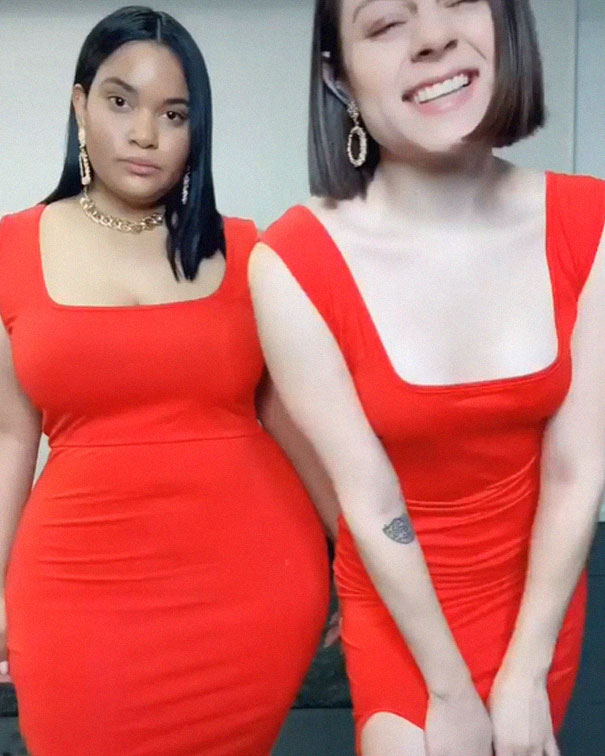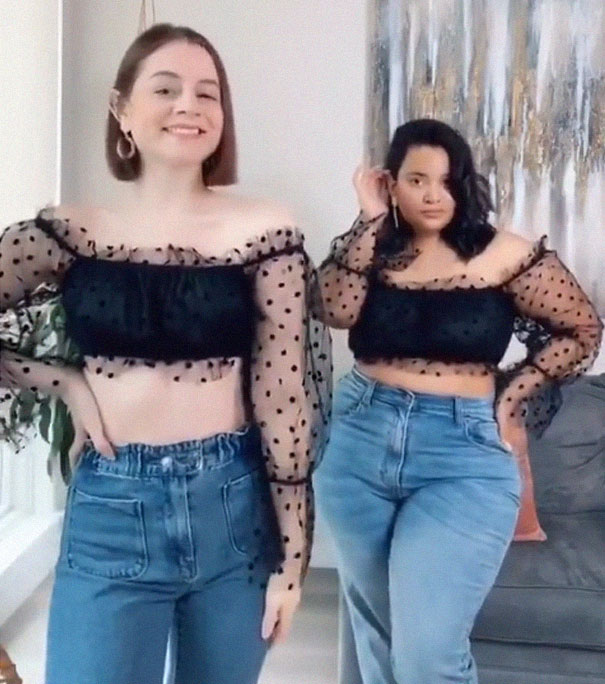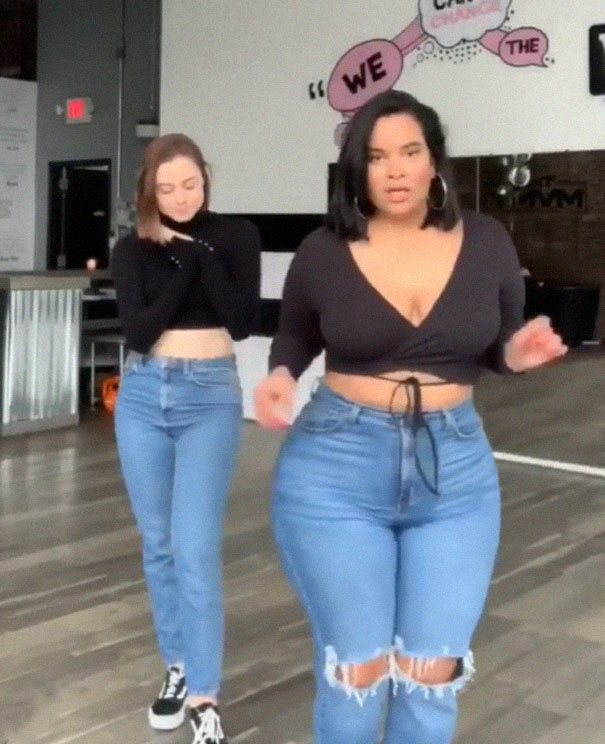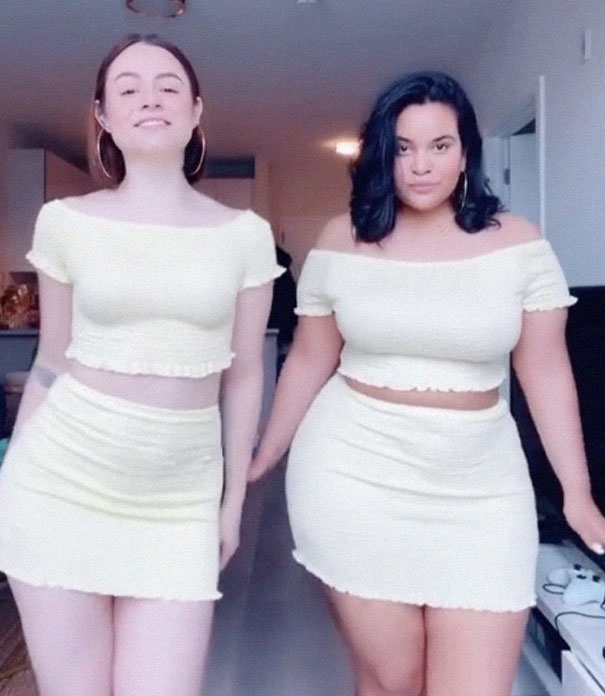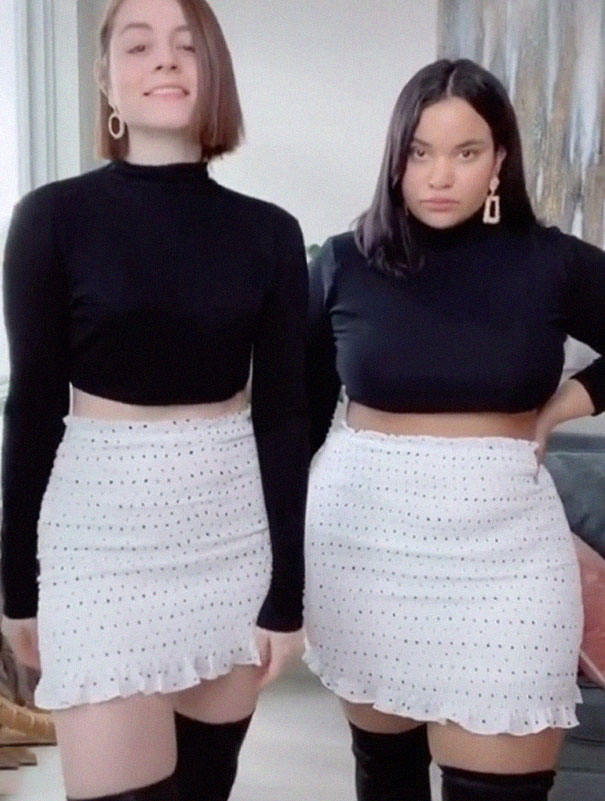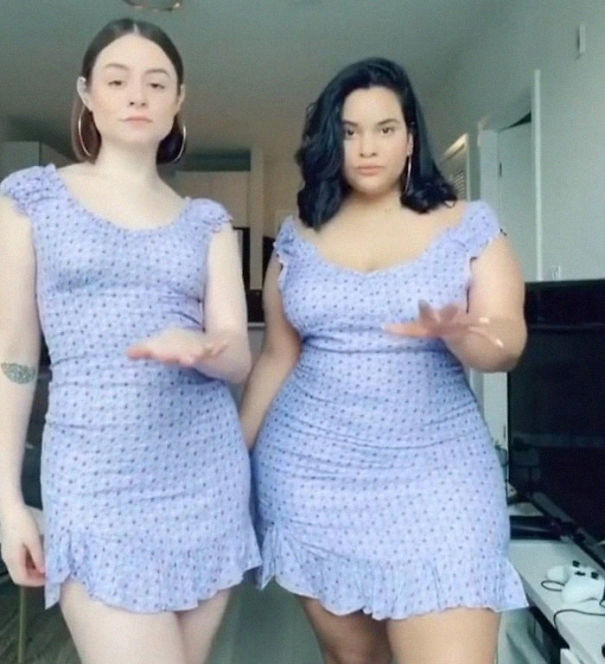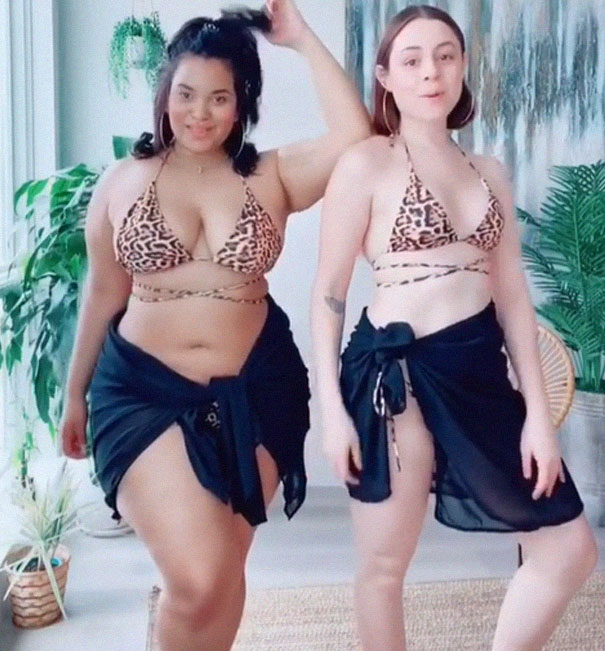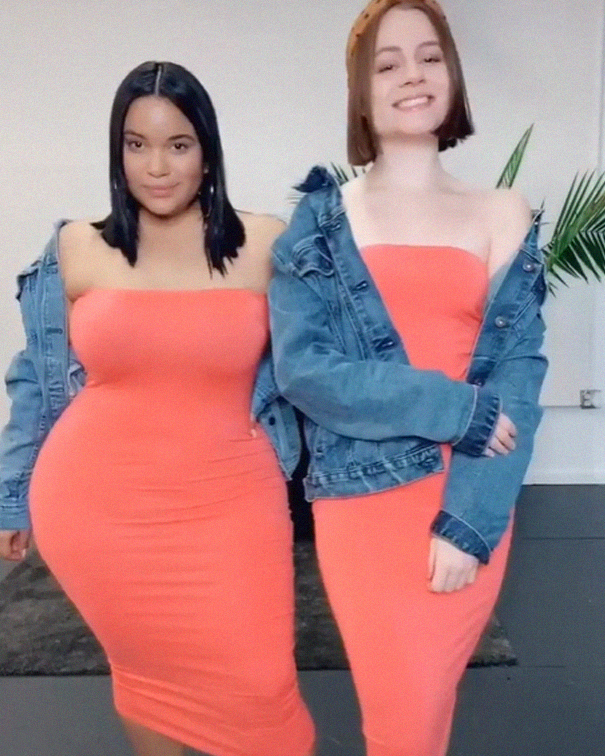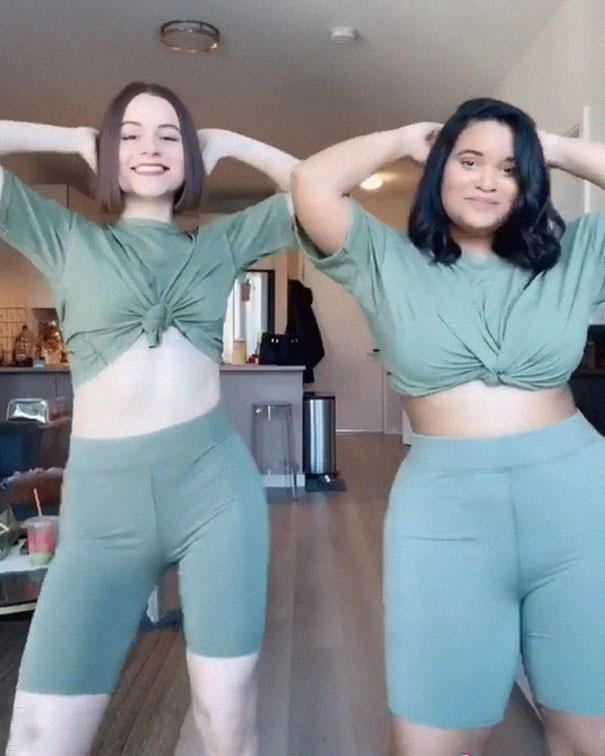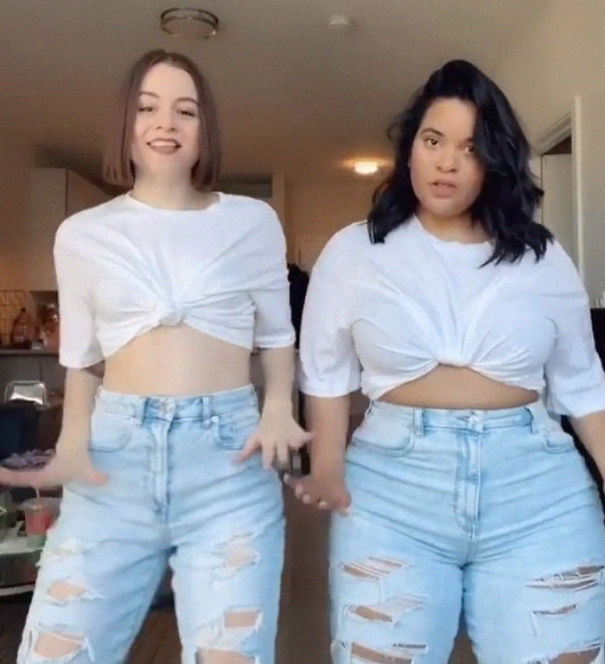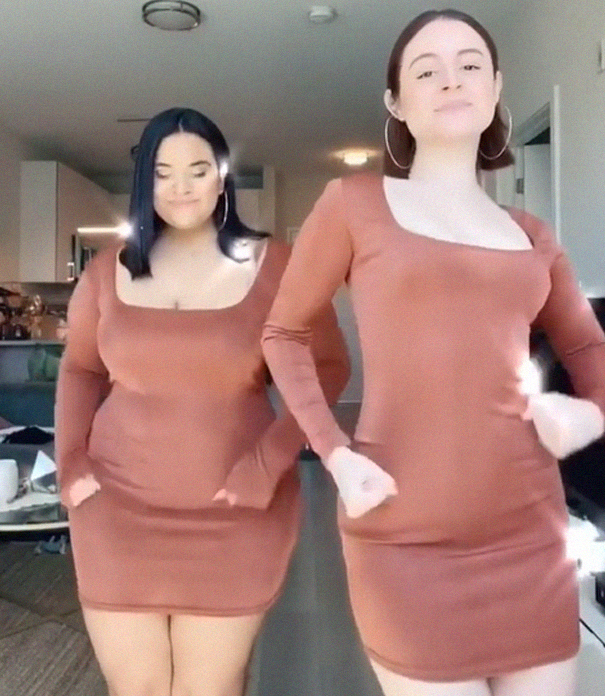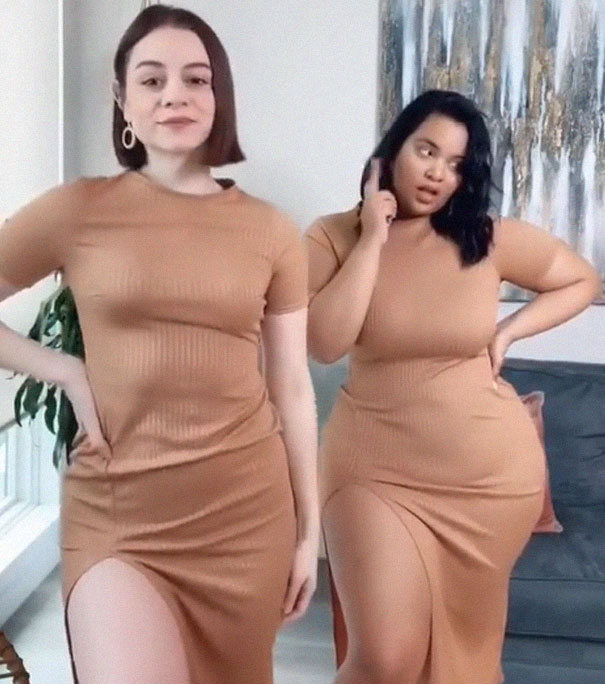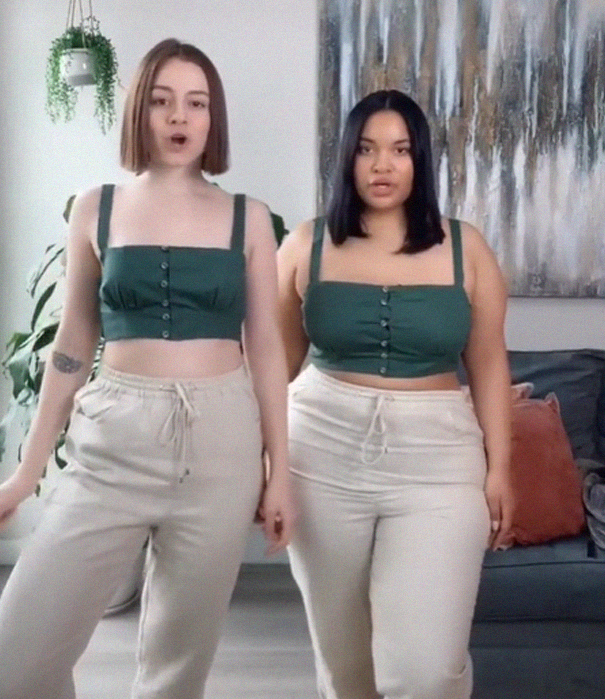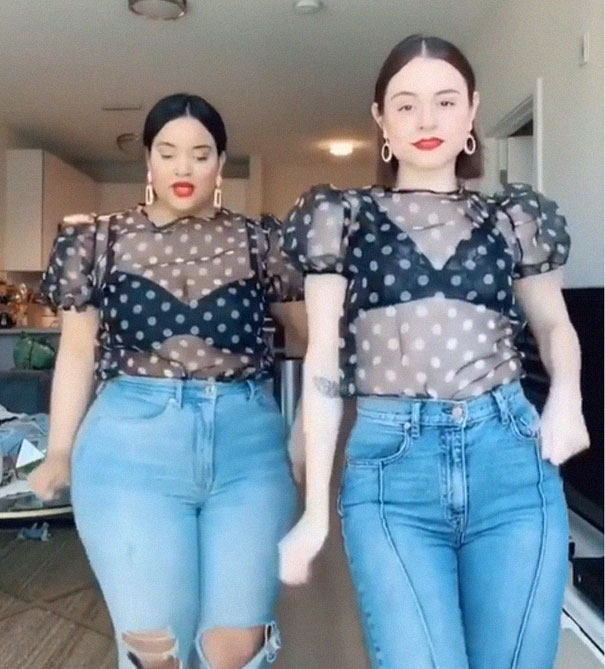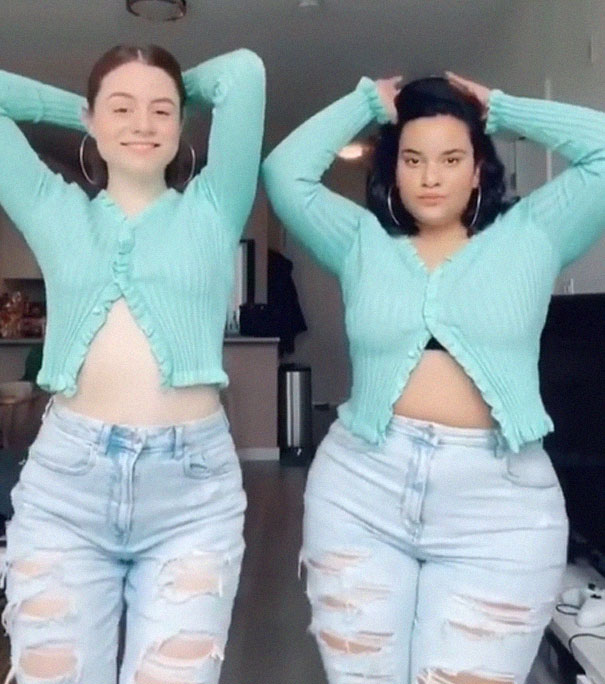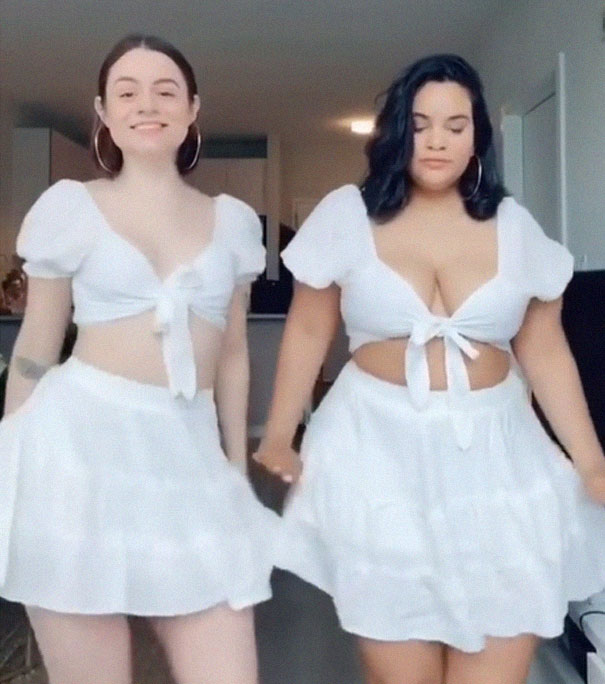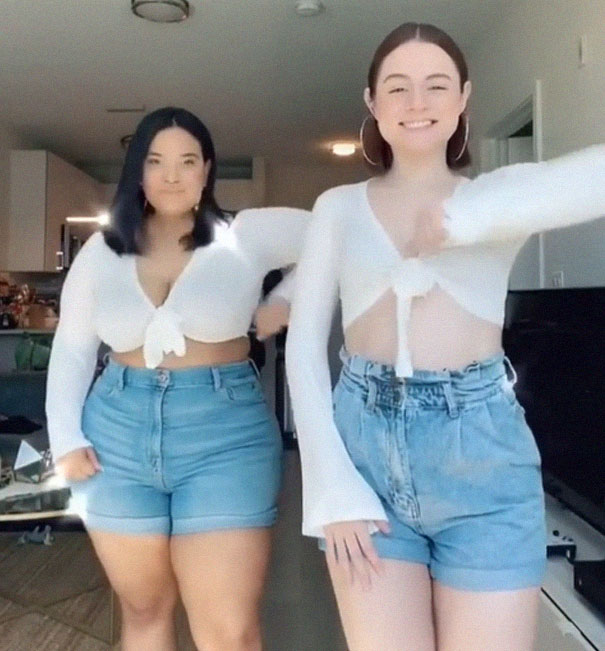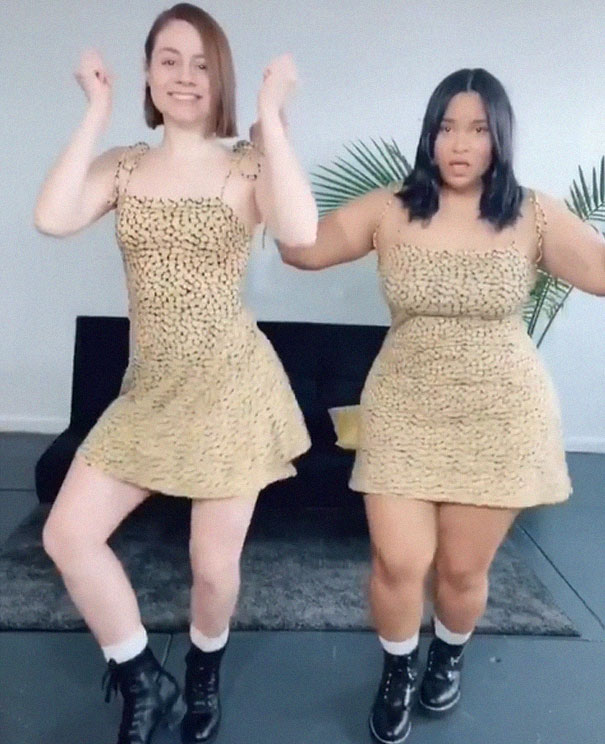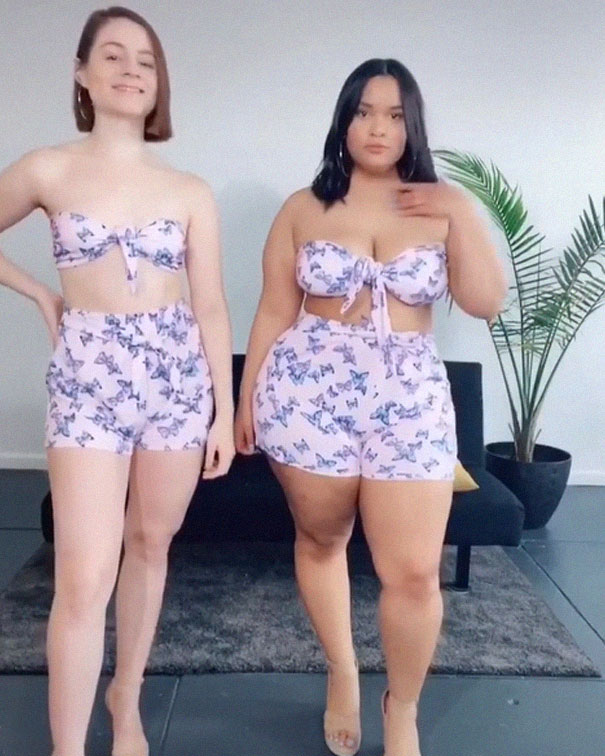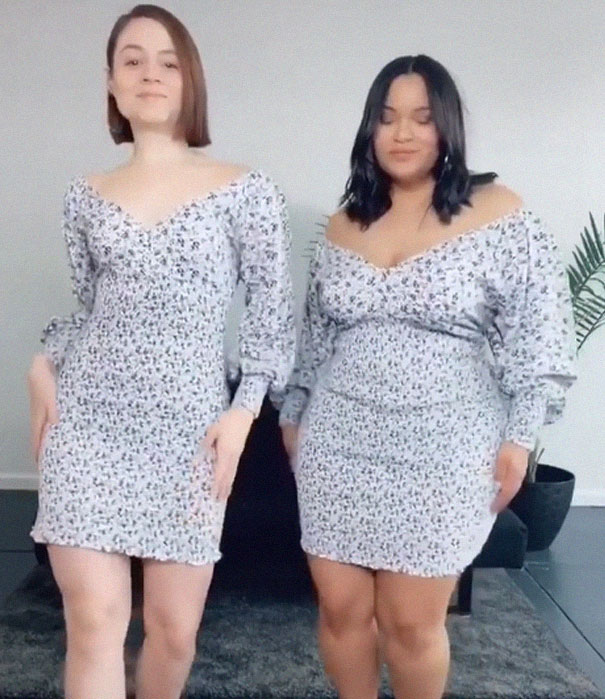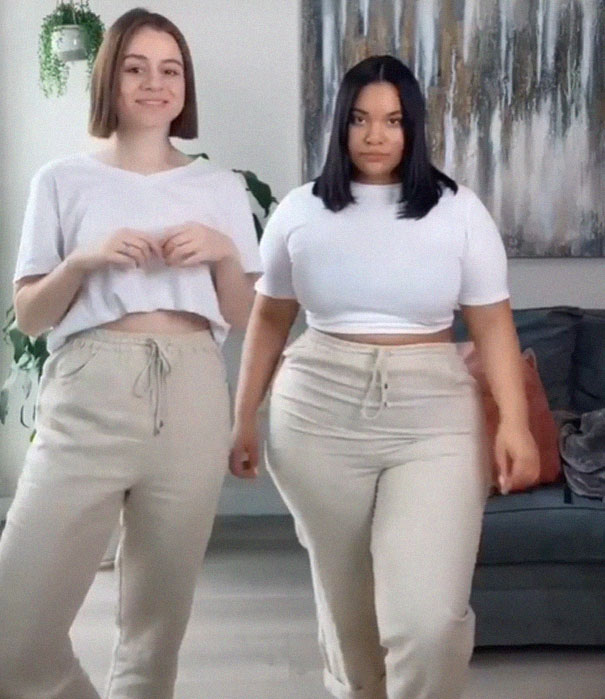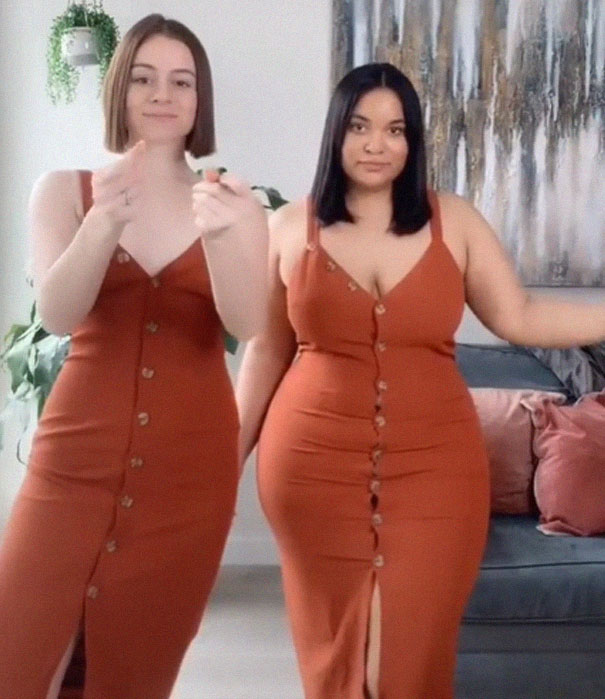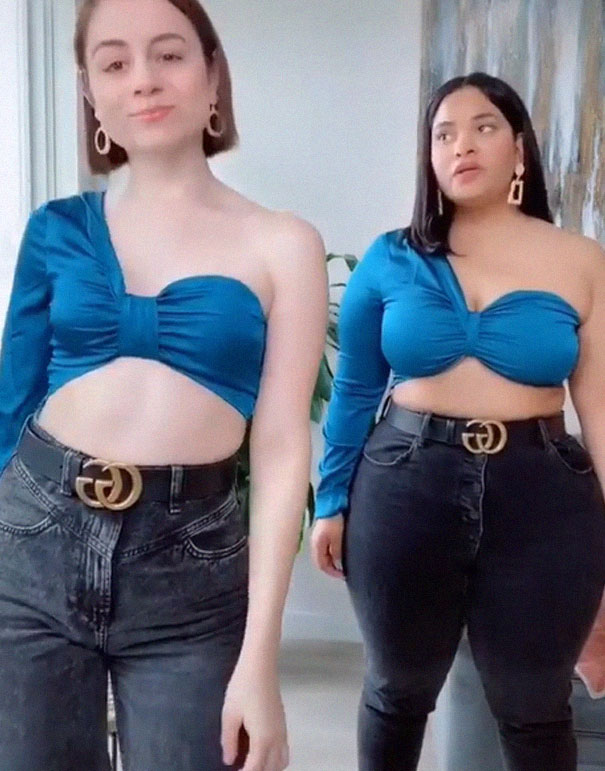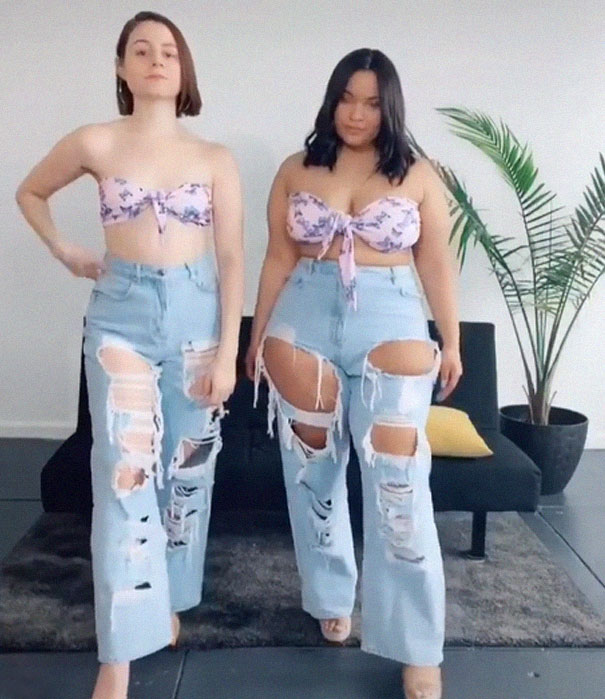It’s no secret that fashion is one hell of a merciless industry. I mean, how many times have we heard how unrealistic body image standards and high expectations have pushed girls to the brink of insanity? And although the stigma around plus-size models is fading away, the steps are so tiny, it’s barely visible.
Luckily, more and more women are willing to take matters into their own hands and rewrite fashion industry rules altogether. One plus-size model, Denise Mercedes, is doing just that. The size 14 Dominican model has launched a TikTok challenge titled “Style Not Size” with her friend Maria Castellanos. The two friends of different body types are putting on the same outfits, sharing the snack-sized videos to 1.7M followers, and showing that beauty comes in all shapes and forms. Their videos have now been liked a whopping 30.6M times, proving that healthy and happy women rule the world!
More info: TikTok | Instagram | Facebook | Twitter | DeniseMercedes.com
This post may include affiliate links.
She looks great, but I cannot see where she is a Size 14. (Although her waist may tiny in comparison.
Load More Replies...I love all of the pics on this thread! Beautiful women come in all shapes/sizes/colors!!! Way to go, ladies!!!
The full figured girl is blessed with a great shape, small waist, flat tummy. Many girls her size are not as blessed and carry it way differently.
All of these pictures are amazing and her curves make her look amazing!
I'm a 14-16 depending on the cut. Proud of Denise but she is not a 14.
Okay... we are all supposed to say they are both beautiful. And that is absolutely true. You’re lovely. Go get life and make it yours. : )
I’d prefer sometimes to be curvy and carry a few extra pounds naturally, than go around looking like the stick that I am.
This particular outfit is more flattering on the woman with less hips and bust, but a lot of the other outfits look better on the woman with the curves! Clothing designers need to remember that hardly anyone has the straight-up-and-down body of runway models.
I'm a heavy gal and the fat ain't going nowhere. I wish I could look as great as the model does in that dress. So nice and curvy!
Why are people downvoting Debster? I think she meant to be complimentary to the curvier girl. She has a gorgeous figure.
Because she was also being insulting to the other girl...
Load More Replies...maybe the color or skin tone but this one looks better on the curvaceous girl.
I thought photo shop, the suits just aren't natural looking
Load More Replies...When Denise was 16 and a petite size 8, she started submitting her pictures to modeling agencies, but her height was too short for industry standards. She kept on posing for the camera as a side hobby until she turned 21 and had gone up to a size 14.
According to a statement on her website, Denise started putting outfits together and posting her cool photos on social media. She is an avid advocate of body positivity and runs a campaign #becauseitsmybody dedicated to women of all shapes and sizes. She now has collaborated with many fashion design brands and boutiques like Forever21, Target, and JCPenney.
I know right. They both look gorgeous. I'm just a tiny bit jealous
Load More Replies...I don’t understand why people would hate on the curvaceous girl - I think she is killing these fits
Omg bby your confidence is amazing!! Like I can feel your energy through the pic!! You can tell that she loves modeling and loves herself 🤍🤍
I think for pretty much all of these I like the same one a bit more and that is the one that in this pic is on the left BEAUTIFUL, of course, I still think both of them look fabulous!!!!
I was thinking the same thing, whatever the case, I love the way the tops were sewn!
Load More Replies...I feel like there's dancing involved in this or tiktok now i want to see the clips.
they are on ticktok actually. i had seen them on wy for you page. but i have no clue where to find them..
Load More Replies...It is like there making sure that the outfits suit Denise but not debs
There’s a huge gap between fashion industry standards and real-life women, who measure a size 16 around the waist on average in America. Moreover, plus-size girls represent 68% of fashion shoppers, according to Glamour, and yet a very small percentage of them actually work in the fashion industry.
Only in 2016, Ashley Graham became the first plus-size model on the cover of Sports Illustrated’s Swimsuit edition and paved the way for models with curves. But the model herself told CBS Sunday Morning that she doesn’t like the word “plus-size” because it’s “so divisive to women” and puts them into categories.
Ashley Graham you are an absolute ROCKSTAR!!! Killing the modeling game, while inspiring millions of girls and women to be comfortable in their own skin and that they too can do whatever they want to do!!
Curvy girl has got An amazing strong personality and really beautiful eyes
Honestly as an overweight woman I WISH i had a body like Denise! She has such a lovely shape to her and looks great in anything she wears. Not to mention how confident and happy she looks.
I just realized that magazines use stereotype slender girls and not the more... curvy girls. RUDE! (this sounds different than I imagined it, no offense meant, just saying magazines are stereotypical)
Curvy model definitely wears the dresses better! But I liked the crop tops more on slender model.
More flattering on larger lady. The fit on the slim lady exposes to much whilst making curves disappear. This is definitely not designed for slimmer women.
Many women find the representation of diverse body types in media more assuring. In fact, this study by Florida State University found that women tend to experience deeper body satisfaction and retain a memory of plus-size models better than that of the thinner ones. It also pointed out that exposure to “unrealistic-sized media models” has a negative effect on the consumer’s “mental and physical health, including experiencing lower body satisfaction.”
she's crushing so many crop tops, and i just don't have the confidence for it. gorgeous
I'm diggin the crop tops too! I'm not quite "curvy" but I am thick and I usually don't have the confidence to wear crop tops but recently I started getting some crop tops and playing with outfits to pull them off cuz I think they're so cute.
Load More Replies...^..I so know what being tiny is all about, my whole life meant altering or just making my own designs to fit. I say this as I notice the elastic wasted jeans on the smaller model; or which either are for children, or small pregnant women.. I found a Versace child’s designer jean with elastic, Great find as the price to buy are hundreds of dollars and I certainly didn’t pay that... Nothing wrong except they didn’t fit the child. Sizes for women have never been consistent or considered important until very recently, and still if one wants to buy something that fits in a pro-womans boutique, then expect to pay more always.. something that doesn’t get spoken about either on the other end of the spectrum , Very naturally tiny women... There has been a quiet argument in Industry for years about how many smaller women just get forgotten > exactly the same if one happens to be that bit larger than the general large size... it’s a conundrum!
Where does she finds jeans that fits so good in both their waist and hips?!? They doesnt make it like this where I live, you have to choose if the waist is ok and your hips explode, or you hips are ok and the waist is falling the whole time
I have a similar figure to her and I find that Old Navy jeans fit me really well.
Load More Replies...looks great on booth never listen to people or you will become what they say you are i learned that the hard way
Curvy girl rocks this! Can't tell with slimmer girl as she is covering up
Perfect summer wear. And for haters, they are COVERED, no cleavage, no crack in the back, skirt long enough. Don't be jealous.
I haven't seen any haters? And skirt is pretty short.. maybe you commented on the wrong post?
Load More Replies...All these outfits that emphasize the waist are more flattering to the hourglass figure. The ones that emphasize length and a sense of space, like that first bikini, are better on the rectangle. This is like a "dos and don'ts" for both body types. Although it's hard to go wrong as a natural hourglass... she could lose or gain 20 pounds and still be perfectly proportioned, whereas her friend HAS to stay thin or she will look like a fat box. I don't know why everyone is going out of their way to baby the "curvy" girl, she's drawn the winning card.
Beautiful, but such a short skirt makes it difficult not to show what you may not want to, especially as we get bigger.
This is my favorite - it is a pretty color and it looks great on both of them.
I love how they both look lovely in every outfit, and you can see how much fun they're having together. This is what's it's supposed to be like having female friends. Not this alpha, lone shewolf, photoshop, trash-talking sickness you see on the daily between females. We got enough obstacles as it is, no need to add to it. Just love yourself and others as you are.
I love curvy girl, but give some love to the other one too! I think both of them are fabulous.
Almost all of these look way better on curvy one. But maybe because I’m curvy too!
Finally, more confidence...Yeah!! I was right..her smile is beautfiul!!!
The wrap is good, curvy girl wears it in best style. Tops not really flattering for either
I don't like this too much but they are still BEAUTIFUL no matter what they wear
I cannot get over how magical that pristine white skin of hers it. You just want to learn calligraphy and write sonnets to her beauty on those abs.
Again - great dress, horrible color! It does nothing for either of their skin tones.
Why they doing the same dance in every pic? Not that they doesn’t look nice but variety is good, I thought that’s why there doing this.. (And I know I’m gonna get downvoted for this but why shouldn’t I speak my mind?)
me too! I didn't realize until I read your comment and then had to look again.
Load More Replies...How did so many people upvote your rude answer? They want to wear it, so who are you to judge? Seriously, who are you? Why don't you take off your fake "Sue Sue" mask and reveal your insecure self? I think they look fine!
Load More Replies...i agree, ugly dress on either..... beautiful girlz, ugly dress.....lol
One reason this dress is not as flattering for either of them is the colour which would look far nicer on someone with freckles and strawberry blonde hair ( Spring toned to compliment someone with warmer skintone.) The curvy girl looks best in Winter toned outfits and the slender girl in Summer toned outfits. The previous two outfits before this are also Spring toned and not right for them.
No it not I think it beautiful. And I hope you don't mean it horrible bc of their body Types
In my opinion, the dark haired girl is wearing pants that are too tight. I like the look, just not the size. Sorry to offend anyone..
I don't think those pants look good on either girl. Based on that I wouldn't buy them.
This is the first one where I think the outfit suits the slimmer girl better. Else the bigger girl wears everything else heaps better.
I agree, very few of these outfits were made with the thin girls body type in mind, the fit is just off on her in most of them
Load More Replies...That top just doesn't look comfortable. It doesn't have anything to do with their shapes. It looks just as uncomfortable on both of them.
Every single thing so far looks better on the bigger girl. Is that on purpose?
curvy girl is slaying this outfit but maybe cover the chest area a bit more
Too much boobage on curvy girl. I can say that because I battled having extra large breasts my whole life. Hard to get clothes to fit or stay buttoned or to NOT look like the "girls" are about to make an appearance at any moment!
Love it and Debster is right. Just make sure not to spill anything on it, especially spaghetti sauce, it’s a pain in the butt to get out.
Personally, I think that this outfit suits slim girl better. No offense to curvy girl.
Sandra Simpson, you don't have to be sorry for your opinion if you state it resectfully. In other cases people thought that the outfit fitted the curvier girl better (including me) and nobody was sorry about it.
Load More Replies...All shapes are beautiful but thos accentuates them curves PERFECT
Ahh interesting, can see feet here too, and for someone who doesn’t enjoy Leppard spot prints, this looks fine due to the footwear.
I think it suits the curvy girl more the skinny girl just doesn't have any thing to fill the top out
Love the dress, although I think that the slim girl looks better in it
OK. You gals shout send these shots to some stores like Target, Nordstrom, etc because this make all of these cloths better with you two different body types in these cloths. Seriously.
Shows off small figure and curvy figure in the best of both ways. STUNNING!
pants look better on the curvy girl and the shirt looks better on the slim girl (P.S. They both look gorgeous in everything this is just my opinion :D)
Why are people a*s holes, there are the awesome and kind hearted people, and then the bully blockheads, y’all who are being nice keep it up. 😌
Sorry, but the buttons shouldn't be tearing apart. It's a beautiful dress, just get a size larger.
It’s FashionNova, sizes there are very unpredictable 🤷♀️
Load More Replies...Those gaping button holes absolutely ruin the look. As a busty girl myself I learned early in life to sew the placket closed on anything that had to cover my boobs. In this case, I think she needs a larger size.
Button up dresses always look cute, until I put it on. Curves pull at the button holes. Even going up a size or two doesn't help me.
Curvy lady, wear it open from the waist down with filmy lacy skirt underneath.
Yeah, the dress is too small but big girl looks better in almost everything in my opinion. But I think curvy is beautiful.
Oh yeah this one gives me anxiety over the strained buttons on the curvy girl. They look like one sneeze away from blowing apart. Definitely needs to go a size up.
Looking at how this dress fits across bust and hips, this is down to the cut of the dress. It's perfectly ample across the bust, but this cut too narrow at the hips. Comparatively, the slender lady is probably a similar measurement at bust and hips, whereas curvy lady has a significantly larger hip measurement that at the bust. The material of the dress will also impact the fit. If you look at her face in the images she is obviously not "rocking it" she knows. The whole point of this is that it is the "style" of the clothing, not the size of the person, that makes an impression
Yikes. That top wouldn't look good on ANYONE.. Sorry, ladies 🤭 y'all are beautiful though - keep it goin - I love this series of pics 🤙🏼
Ok speaking from experience, the belt looks HORRIFICALLY painful on the curvy girl oml
it doesnt look that tight ive seen people with tighter ones
Load More Replies...The top looks like something they thought would be worn in “the future” back in the 70’s. Like, on a sci-fi show set in space.
Is it just me , or do most outfits actually look better on the "bigger" girl!?!
Yes! I wasn't expecting that. I sent this to my husband without adding any text and he after looking he said, "Wow! The dark haired girl looks the best in most of these outfits. Both are attractive but I think the dark haired girl gives more style to the clothes." My thoughts exactly.
Load More Replies...Honestly, there is torn jeans, and then there are devastated jeans. These are devastated,
At least half of these pictures show the curvier model slightly or more, behind the slender one. What's up with that?
I think they both look great but I actually found most of the clothes really suited the curvier woman best. Maybe it is the style of clothes chosen. This just goes to show why we need models of all sizes coz clothes look very different on different sizes.
I think it's because the slimmer girl doesn't have a narrow waist, so form-fitting clothes meant to show off the mid-section or hips curve just don't look as good on her. She looks great in the pics where she's wearing clothes that are more loose or create the illusion of a narrower waist. Clothes really need to be designed with different body types in mind, it's not just the size that matters. That's why rich/famous people have everything tailored.
Load More Replies...They both look great but most curvier/plus size women do not have dimensions remotely close to Denise. Her waist is pretty small and not much larger than her slim friends...then she has a larger just even for a plus size person and wide hips. I'm plus size and my widest point is my waist, my hips are the narrowest and these clothes would not be flattering on my figure at all. I wouldnt call this 'style, not size' ...because the curvier girl is the ideal size/proportions for curvy.
very realistic point of view. Their photos are shown with good intentions but they miss their own point
Load More Replies...I think average person does not look like Denise either. So what's the point here? Clothes does look differently on different bodies, no kidding! What an idea.
I am size 10, a curvy girl, without curves, the clothes would never look like her. The curved models also surpass the normal woman, they usually have a very small waist, and they have a slim woman's face.
Load More Replies...When I was a teenager, I remember my mother pulled a box out of the attic to look through. I side were some fashion magazines from right before she got married (so pre-1941). Inside, every picture of an outfit showed it on three models: one tall and thin, one average size, and one plus size. My mother said they used to do it that way so everyone could get a better idea how the cut and drape might look on them. It made perfect sense to me back then, and I don’t understand why, in this age of supposed acceptance of all body sizes, the fashion industry doesn’t start doing it again.
guys. the point of the article was not to compare the two lovely women and put them against each other. the point was to demonstrate that all bodies can rock an outfit. saying the curvy girl rocked it more is not any better than saying the skinny girl did because you're still setting up unhealthy comparisons and judgements. the point is you can wear what makes you happy no matter your body type. and those of you saying they should've compared girls with other body types, these are friends! these are the bodies they have to work with! the point is that your own body is good enough!
I think the same too... Stop the comparisons, stop saying one is more beautiful than the other... We are all beautiful in our own way...
Load More Replies...Dear Denise, You have a waist to kill for. This is not "average" by any means, and very different from a typical plus-sized person's experience. Still gorgeous session tho.
Yes, she has no belly and a very toned ab area. Really quite a beautiful figure.
Load More Replies...Even though the larger girl is a size 14, she can get away with wearing the majority of outfits because she still has a relatively flat belly and no bulges below. Her size mostly comes from the width of her hips and thighs, with her big boobs gives the hourglass figure. I'm only a size 10-12 but I'd look terrible in them because my belly is hideous and bulges out in the wrong way.
I think they both look great but I actually found most of the clothes really suited the curvier woman best. Maybe it is the style of clothes chosen. This just goes to show why we need models of all sizes coz clothes look very different on different sizes.
I think it's because the slimmer girl doesn't have a narrow waist, so form-fitting clothes meant to show off the mid-section or hips curve just don't look as good on her. She looks great in the pics where she's wearing clothes that are more loose or create the illusion of a narrower waist. Clothes really need to be designed with different body types in mind, it's not just the size that matters. That's why rich/famous people have everything tailored.
Load More Replies...They both look great but most curvier/plus size women do not have dimensions remotely close to Denise. Her waist is pretty small and not much larger than her slim friends...then she has a larger just even for a plus size person and wide hips. I'm plus size and my widest point is my waist, my hips are the narrowest and these clothes would not be flattering on my figure at all. I wouldnt call this 'style, not size' ...because the curvier girl is the ideal size/proportions for curvy.
very realistic point of view. Their photos are shown with good intentions but they miss their own point
Load More Replies...I think average person does not look like Denise either. So what's the point here? Clothes does look differently on different bodies, no kidding! What an idea.
I am size 10, a curvy girl, without curves, the clothes would never look like her. The curved models also surpass the normal woman, they usually have a very small waist, and they have a slim woman's face.
Load More Replies...When I was a teenager, I remember my mother pulled a box out of the attic to look through. I side were some fashion magazines from right before she got married (so pre-1941). Inside, every picture of an outfit showed it on three models: one tall and thin, one average size, and one plus size. My mother said they used to do it that way so everyone could get a better idea how the cut and drape might look on them. It made perfect sense to me back then, and I don’t understand why, in this age of supposed acceptance of all body sizes, the fashion industry doesn’t start doing it again.
guys. the point of the article was not to compare the two lovely women and put them against each other. the point was to demonstrate that all bodies can rock an outfit. saying the curvy girl rocked it more is not any better than saying the skinny girl did because you're still setting up unhealthy comparisons and judgements. the point is you can wear what makes you happy no matter your body type. and those of you saying they should've compared girls with other body types, these are friends! these are the bodies they have to work with! the point is that your own body is good enough!
I think the same too... Stop the comparisons, stop saying one is more beautiful than the other... We are all beautiful in our own way...
Load More Replies...Dear Denise, You have a waist to kill for. This is not "average" by any means, and very different from a typical plus-sized person's experience. Still gorgeous session tho.
Yes, she has no belly and a very toned ab area. Really quite a beautiful figure.
Load More Replies...Even though the larger girl is a size 14, she can get away with wearing the majority of outfits because she still has a relatively flat belly and no bulges below. Her size mostly comes from the width of her hips and thighs, with her big boobs gives the hourglass figure. I'm only a size 10-12 but I'd look terrible in them because my belly is hideous and bulges out in the wrong way.

 Dark Mode
Dark Mode 

 No fees, cancel anytime
No fees, cancel anytime 






